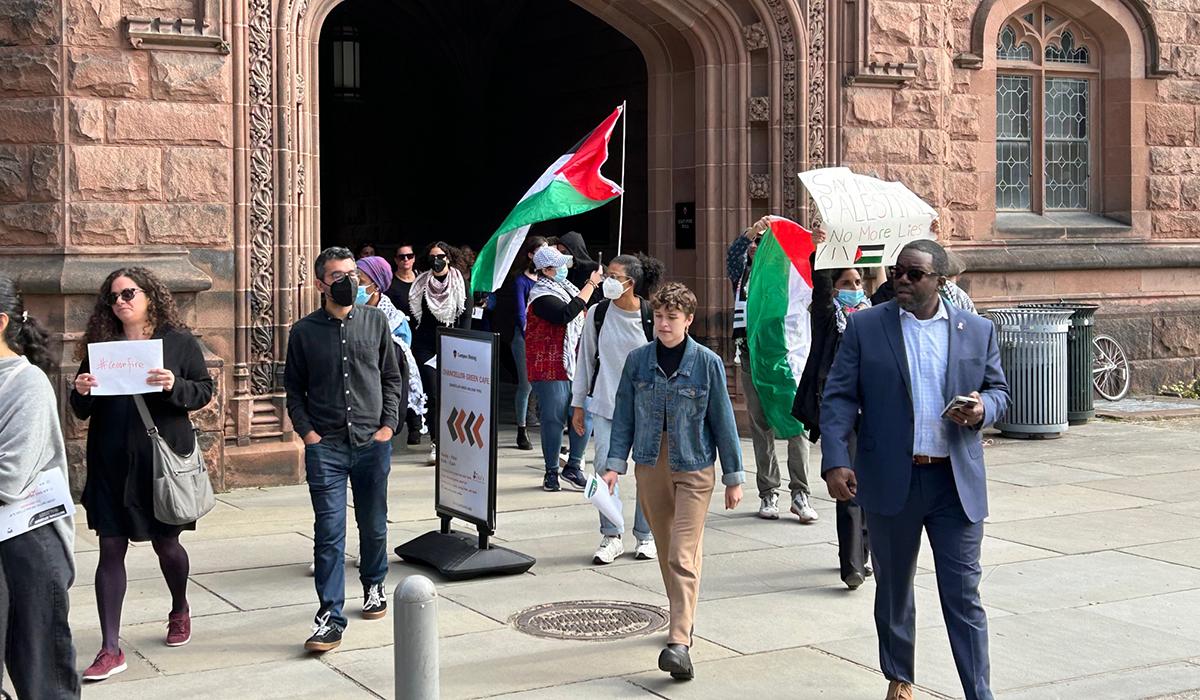Editor’s note: This story was updated from its original version on Oct. 26 after people on campus brought PAW new details and a video taken at the walkout event.
About 400 people, predominantly students, gathered on the north lawn of Frist Campus Center at noon on Oct. 25 for an hourlong walkout in solidarity with Palestine, organized by an ad hoc group of graduate students and promoted by Princeton Students for Justice in Palestine. While the event was orderly, some of the language used by protesters, including a chant calling for an “intifada,” sparked complaints in the hours following the walkout.
About 50 students in support of Israel staged a counterprotest nearby, and Public Safety placed temporary fencing between two sides. The pro-Israeli group stood silently and held signs with photos of individuals killed or kidnapped by Hamas. At Nassau Hall, a man wrapped in an Israeli flag was standing at the top of the steps when the walkout group arrived. Students with Palestinian flags joined him on the steps, and a campus staff member directed them to stand apart.
The pro-Palestinian group chanted, “We want justice, you say how? End the siege on Gaza now,” and, “Brick by brick, wall by wall, apartheid has got to fall.” The most divisive chant was “Intifada, intifada, long live the intifada,” which some people view as an incitement to violence. Clem Brown ’21, in an opinion column for The Daily Princetonian, wrote that “Intifada means civil uprising. Intifada in the context of Israel means mass slaughter of Jews in the name of resistance — men, women, and children.”
Aditi Rao, a graduate student who helped to organize the protest, said that the chant was meant as a call for the liberation of Palestinians. In an email to PAW, she acknowledged the need “to be honest and careful with our terms,” adding that “Intifada, honestly and carefully, comes from generations of Palestinian thought, intellectualism, and activism to define the lifespan of the liberation movement and struggle for decolonization. I think it behooves us, living in the West, to turn towards Palestinians to seek terms to define and describe their own liberation.”
A student who identified herself as Gemma led the “intifada” chant and read a statement on behalf of “a concerned and agitated group of graduate students,” which denounced U.S. support for Israel and condemned “ethnic cleansing, collective punishment, and ongoing genocide of the Palestinian people in Gaza and the West Bank.” (Gemma declined to be interviewed after the walkout.)
The statement also criticized Princeton’s treatment of Palestinians in the campus community, urging the University to “begin supporting them and making them feel seen and safe by offering the same support that they have offered Israeli students on this campus.”
President Christopher Eisgruber ’83, in an Oct. 10 statement to the campus community, said that the University had “reached out to students and other community members from Israel and the Palestinian territories” and listed counseling and support services available on campus.
Less than half an hour before the walkout event, the University sent a campus-wide alert that said the Department of Public Safety “became aware of a threatening social media post” that referred to the walkout. Several uniformed Public Safety officers and Princeton administrators were present throughout the protest, following the pro-Palestinian group as it marched to Nassau Hall at about 12:30 p.m.
This was Princeton’s first large demonstration related to the conflict in Gaza since students returned from fall break. Before the break, students gathered at two campus vigils, one hosted by Chabad at Princeton and the Center for Jewish Life and another organized by Students for Justice in Palestine.
Rao said it was “profoundly encouraging” to see the turnout and the atmosphere of the event.
“As soon as it became clear that the demonstration would be larger than [just the graduate student organizers], we reached out to the free speech office that the University has,” Rao said.
The fence, she said, helped to set boundaries, “but I don’t want this to ever feel like it’s an us-versus-them situation. … This was about the freedom and safety of people living in Gaza and Palestine right now.”
“It’s very important that students feel safe and comfortable participating in demonstrations like this,” Rao said. “[I feel] like I, as a graduate student will not be retaliated against for planning an event like this. That’s not the atmosphere at every campus.”

